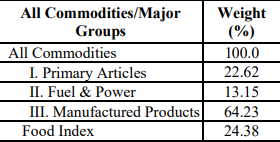Wholesale Prices in Deflation Zone | 16 Nov 2023
Source: TH
Why in News?
In October 2023, India's Wholesale Price Index (WPI) recorded an annual inflation rate of -0.52%, down from -0.26% in September 2023.
- The negative inflation is due to price declines in sectors such as chemicals, electricity, textiles, basic metals, food products, and paper compared to October 2022.
- This deflationary trend is influenced by a high base effect from October 2022 when wholesale price inflation was 8.4%.
Note: In terms of food prices, the Wholesale Food Index increased by 1.07% compared to the 2022. Within the food basket, there were divergent trends, notably a substantial 21% decrease in vegetable prices, while inflation in paddy and cereals experienced an acceleration.
What is the Wholesale Price Index?
- WPI represents the price of goods at a wholesale stage i.e. goods that are sold in bulk and traded between organizations instead of consumers.
- Whereas, Consumer Price Index (CPI) captures changes in prices levels at the consumer level.
- WPI does not capture changes in the prices of services, which CPI does.
- In India, WPI is published by the Office of Economic Adviser, Department for Promotion of Industry and Internal Trade (DPIIT), under the Ministry of Commerce and Industry.
- It is used as an important measure of inflation in India.
- Base year of WPI is 2011-2012.
- Weightage of Commodities in WPI:
Key Terms
- Inflation Rate:
- In the context of WPI, Inflation rate is the difference between WPI calculated at the beginning and the end of a year.
- The percentage increase in WPI over a year gives the rate of inflation for that year.
- Deflation:
- Deflation is a decrease in the general price level of goods and services. It occurs when the inflation rate falls below 0%, which is known as negative inflation.
- Base Effect:
- Base effect is the impact of inflation in the previous year on the current year's price levels.
- For instance, if the prior year had low inflation, even marginal price hikes in the current period could yield disproportionately high inflation rates.
UPSC Civil Services Examination, Previous Year Question (PYQ)
Prelims
Q. Consider the following statements: (2020)
- The weightage of food in Consumer Price Index (CPI) is higher than that in Wholesale Price Index (WPI).
- The WPI does not capture changes in the prices of services, which CPI does.
- The Reserve Bank of India has now adopted WPI as its key measure of inflation and to decide on changing the key policy rates.
Which of the statements given above is/are correct?
(a) 1 and 2 only
(b) 2 only
(c) 3 only
(d) 1, 2 and 3
Ans: (a)

